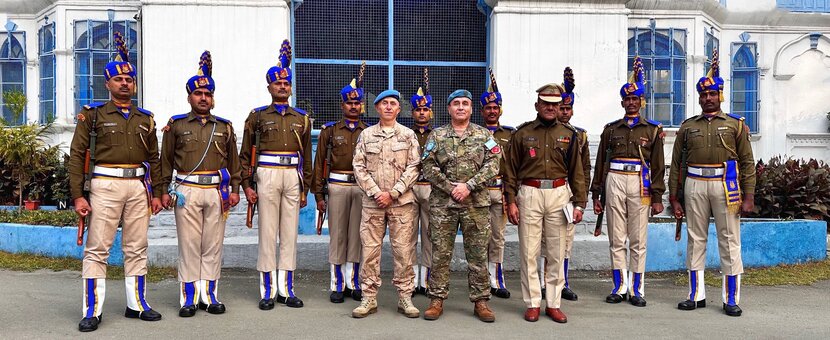
Spokesman Report
islamabad: On April 2, 2025, Manoj Sinha, Lieutenant Governor of Indian occupied Kashmir made a public pronouncement that there was no need for the United Nations office now in Srinagar, citing “improved conditions” in the occupied territory.
Manoj Sinha Ji, we understand that day dreaming is not a crime but a normal human activity. Since you are unaware or ignorant about the historical facts, so you need a brief historical recap.
It was on January 20, 1948, that the UN Security Council adopted a resolution # 39 which states, “A Commission of the Security Council is hereby established, composed of representatives of three Members of the United Nations, one to be selected by India, one to be selected by Pakistan, and the third to be designated by the two so selected. Each representative on the Commission shall be entitled to select his alternates and assistants.”
Manoj Sinha Ji, as you know it very well that the headquarters of UNMOGIP are located in Srinagar (May-October) and Islamabad (November-April). Currently, there are 109 total personnel, 69 civilians and 40 experts on Mission. Antonio Guterres, the United Nations Secretary-General announced on November 13, 2024, the appointment of Major General Ramón Guardado Sánchez of Mexico as Head of Mission and Chief Military Observer for the United Nations Military Observer Group in India and Pakistan (UNMOGIP).
Manoj Sinha Ji, one more historical account is that a resolution adopted by UN Security Council cannot be terminated by a governor or even a prime minister of a country. It can only be superseded or amended by a subsequent resolution, effectively rendering the earlier one ineffective. More importantly, it was none other than the Secretary-General of the United Nations who articulated the position that ‘UNMOGIP can only be terminated by a decision of the Security Council, and in the absence of such a decision, it has been maintained with the same arrangements since then.’
I think it is important to mention here that the United States has been a leading member of the UNMOGIP, and it has contributed to it with individual like George Edward Scheibner, who served as Chief of Mission Support.
Now, let us analyze the legal ground of the pronouncement of Sinha Ji. Christopher Hitchens has made it easy to understand when he said,” Perhaps you notice how the denial is so often the preface to the justification.” And George R.R. Martin confirms it by saying “Most men would rather deny a hard truth than face it.”
Sinha Ji has conveniently forgotten that India and Pakistan are signatories to various United Nations Security Council resolutions, including the resolution # 39 of January 20, 1948. These resolutions constitute an agreement because, unlike most resolutions of the Security Council, their provisions were first negotiated with both India and Pakistan and, it was only after their written consent was obtained that they were adopted by the Security Council. These resolutions are binding on both parties to respect the verdict of the people of Kashmir to be obtained through a free vote under the impartial supervision of the United Nations. India, however, recognizing that the people of Kashmir would never freely vote accession to India; it contrived excuse after excuse to frustrate a plebiscite. One of the excuses is that Kashmir is an integral part of India.
It is a recorded occurrence that under all international agreements, agreed by both India and Pakistan, negotiated by the United Nations and accepted by the Security Council, today Kashmir does not belong to any member state of the United Nations. So, if Kashmir does not belong to any member state of the United Nations, then the claim that Kashmir is an integral part of India does not stand.
Secondly, Ms. Helen Clark, the Prime Minister of New Zealand told the Parliament on October 15, 12004 that, “It is perfectly obvious to the whole world that Kashmir is a flashpoint for tensions between the two countries. Most countries do not regard it as simply an internal affair.”
Thirdly, it may be helpful to narrate a story here of a distinguished diplomat of India, Barrister Minoo Masani, former Indian Ambassador to Brazil. The story was published in Dalit Voice, Bangalore, India on August 1, 1990. Ambassador Masani wrote, ‘A lady asked me other day, ‘why Gorbachev would not agree to the Lithuanian demand for independence from the Soviet Union.’ I countered with the question: ‘Do you believe that Kashmir belongs to India?’ ‘Yes, of course’ she said. ‘That is why?’ I said, ‘There are too many Russians who wrongly believe that Lithuania belongs to the Soviet Union, just as you believe that Kashmir belongs to India.’
Manoj Sinha Ji needs to understand that a sincere and serious effort towards a just settlement of the Kashmir dispute must squarely deal with the realities of the situation and fully respond to the people’s rights involved in it. The fabricated pronouncements that ignore the wishes of the people of all five zones of Kashmir -– Valley, Jammu, Ladakh, Azad Kashmir & Gilgit-Baltistan — and is designed to sidetrack the United Nations will not only prove to be an exercise in futility but can also cause incalculable human and political damage to all parties concerned.







